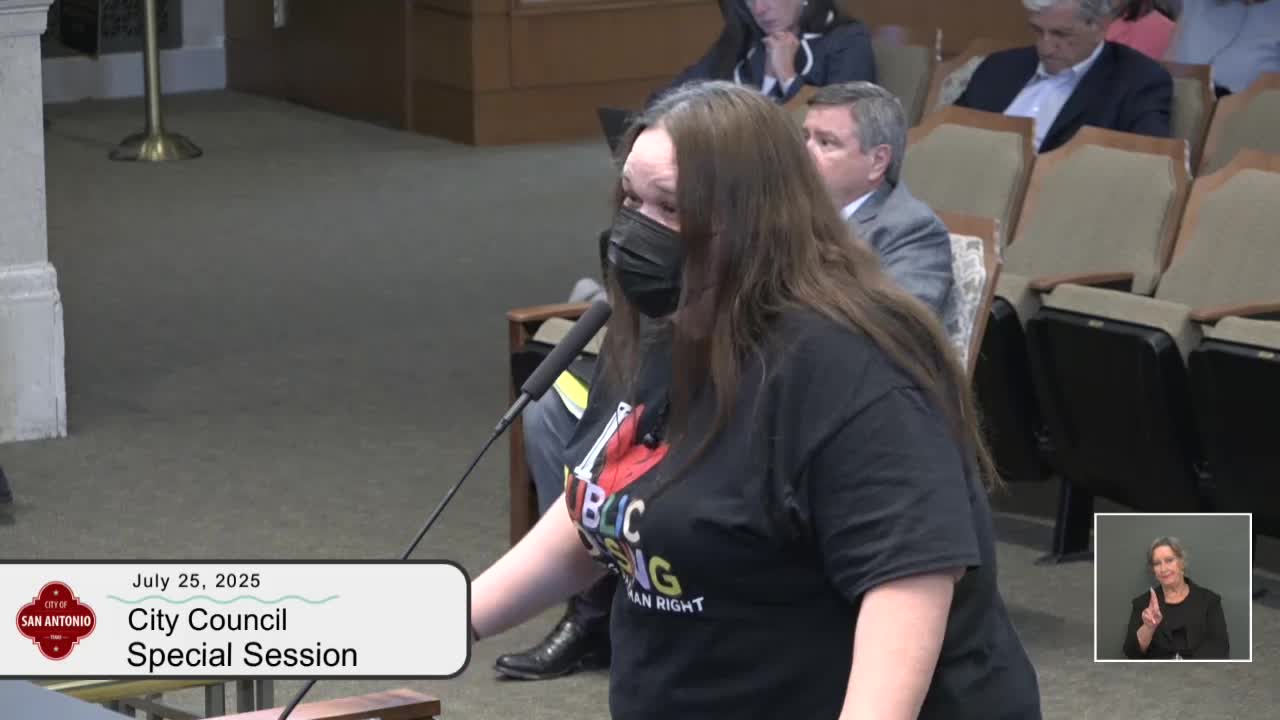Community Activists Urge San Antonio Council to Prioritize Affordable Housing Over Entertainment Projects
July 25, 2025 | San Antonio, Bexar County, Texas
This article was created by AI summarizing key points discussed. AI makes mistakes, so for full details and context, please refer to the video of the full meeting. Please report any errors so we can fix them. Report an error »

In the heart of San Antonio, a passionate plea echoed through the city council chambers during a special meeting on July 25, 2025. Residents, advocates, and students gathered to voice their concerns about the pressing issue of affordable housing, juxtaposed against the backdrop of proposed funding for a new entertainment district.
One resident, a public housing tenant and community organizer, stood before the council, challenging the city’s priorities. “If you can find millions or billions of dollars to fund an entertainment center, why can you not find the funding to provide truly affordable housing?” they asked, highlighting the stark contrast between the city’s investments in leisure and the dire need for basic living conditions. With many workers in San Antonio earning as little as $8 to $10 an hour, the speaker emphasized that the cost of living demands a wage of at least $25 an hour for a single adult to survive.
The urgency of the situation was palpable as they described the deteriorating conditions in their neighborhood, where poor infrastructure and flooding risks compounded the struggles of low-income families. “We cannot afford what is called market rate,” they lamented, urging the council to prioritize housing over entertainment. “It is more important that we have a roof over our head than someone can go to a game in a brand new stadium.”
Following this heartfelt testimony, Melody Miranda, a tenth grader and community advocate, echoed similar sentiments. “I worry about the costs of living when I finish school,” she shared, emphasizing that the decisions made today would shape the future for her generation. She called for a focus on meeting the essential needs of the community rather than investing in projects that cater to wealthier residents.
Nadia Miranda, a college student and fellow community member, added her voice to the chorus of dissent against the proposed Project Marvel. She articulated the burdens of student loans and living expenses, revealing how public housing had afforded her the opportunity to pursue education without the overwhelming pressure of multiple jobs. “Who’s this for? It’s not for me,” she questioned, underscoring the disconnect between city planning and the realities faced by many residents.
As the meeting progressed, the collective message was clear: the community is calling for a shift in priorities. With a new council in place, there is hope that the voices of those most affected by housing insecurity will be heard, and that the city will take meaningful steps toward addressing the urgent need for affordable housing. The residents of San Antonio are not just asking for change; they are demanding it, with the hope that their city will invest in its people rather than in projects that serve only a select few.
One resident, a public housing tenant and community organizer, stood before the council, challenging the city’s priorities. “If you can find millions or billions of dollars to fund an entertainment center, why can you not find the funding to provide truly affordable housing?” they asked, highlighting the stark contrast between the city’s investments in leisure and the dire need for basic living conditions. With many workers in San Antonio earning as little as $8 to $10 an hour, the speaker emphasized that the cost of living demands a wage of at least $25 an hour for a single adult to survive.
The urgency of the situation was palpable as they described the deteriorating conditions in their neighborhood, where poor infrastructure and flooding risks compounded the struggles of low-income families. “We cannot afford what is called market rate,” they lamented, urging the council to prioritize housing over entertainment. “It is more important that we have a roof over our head than someone can go to a game in a brand new stadium.”
Following this heartfelt testimony, Melody Miranda, a tenth grader and community advocate, echoed similar sentiments. “I worry about the costs of living when I finish school,” she shared, emphasizing that the decisions made today would shape the future for her generation. She called for a focus on meeting the essential needs of the community rather than investing in projects that cater to wealthier residents.
Nadia Miranda, a college student and fellow community member, added her voice to the chorus of dissent against the proposed Project Marvel. She articulated the burdens of student loans and living expenses, revealing how public housing had afforded her the opportunity to pursue education without the overwhelming pressure of multiple jobs. “Who’s this for? It’s not for me,” she questioned, underscoring the disconnect between city planning and the realities faced by many residents.
As the meeting progressed, the collective message was clear: the community is calling for a shift in priorities. With a new council in place, there is hope that the voices of those most affected by housing insecurity will be heard, and that the city will take meaningful steps toward addressing the urgent need for affordable housing. The residents of San Antonio are not just asking for change; they are demanding it, with the hope that their city will invest in its people rather than in projects that serve only a select few.
View full meeting
This article is based on a recent meeting—watch the full video and explore the complete transcript for deeper insights into the discussion.
View full meeting
